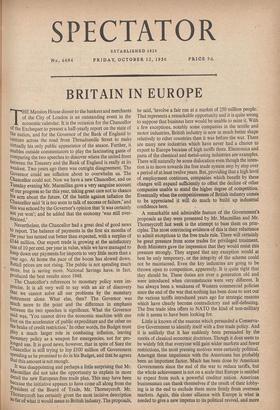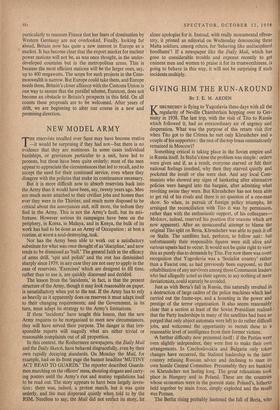BRITAIN IN EUROPE
THE Mansion House dinner to the bankers and merchants of the City of London is an outstanding event in the economic calendar. It is the occasion for the Chancellor of the Exchequer to present a half-yearly report on the state of the nation, and for the Governor of the Bank of England to venture across the road from Threadneedle Street to make virtually his only public appearance of the season. Further, it enables outside commentators to play the fascinating game of comparing the two speeches to discover where the united front between the Treasury and the Bank of England is really at its Weakest. Two years ago there was outright disagreement. The Governor could see inflation about to overwhelm us. The Chancellor could not. Now we have a new Chancellor, and on Tuesday evening Mr. Macmillan gave a very sanguine account of our progress so far this year, taking great care not to chance his arm about the future. Of the battle against inflation the Chancellor said 'it is too soon to talk of success or failure,' and this was echoed by the Governor's opinion that 'it was certainly not yet won'; and he added that the economy 'was still over- strained.'
Nevertheless, the Chancellor had a great deal of good news to report. The balance of payments in the first six months of the year has turned out better than expected, with a surplus of £144 million. Our export trade is growing at the satisfactory rate of 10 per cent. per year in value, while we have managed to keep down our payments for imports to very little more than a Year ago. At home the pace of the boom has slowed down. Retail prices are not rising. The public is not spending much more, but is saving more. National Savings have, in fact. produced the best results since 1948.
The Chancellor's references to monetary policy were im- precise. It is all very well to say with an air of discovery that we cannot solve all our problems by the monetary instrument alone. What else, then? The Governor was much more to the point and the difference in emphasis between the two speeches is significant. What the Governor said was, 'You cannot drive the economic machine with one foot on the accelerator of public expenditure and the other on the brake of credit restriction.' In other words, the Budget must Play a much larger role in combating inflation, leaving monetary policy as a weapon for emergencies, not for pro- longed use. It is good news, however, that in spite of Suez the Chancellor is still trying to lop £100 million off Government spending as he promised to do in his Budget, and that he agrees that this amountis not enough. It was disappointing and perhaps.a little surprising that Mr. Macmillan did not take the opportunity to explain in more detail the new European free trade plan. This may have been because the initiative appears to have come all along from the President of the Board of Trade, Mr. Thorneycroft. Mr. Thorneycroft has certainly given the most incisive description so far of what it would mean to British industry. The proposals, he said, 'involve a fair run at a market of 250 million people.' That represents a remarkable opportunity and it is quite wrong to suppose that business here would be unable to seize it. With a few exceptions, notably some companies in the textile and motor industries, British industry is now in much better shape relatively to other countries than it was before the war. There are many new industries which have never had a chance to export to Europe because of high tariffs there. Electronics and parts of the chemical and metal-using industries are examples. There will naturally be some dislocation even though the inten- tion is to move towards the free trade system step by step over a period of at least twelve years. But, providing that a high level of employment continues, companies which benefit by these changes will expand sufficiently to offset the decline of other companies unable to stand the higher degree of competition. Eventually when the competitiveness of British industry comes to be appreciated it will do much to build up industrial confidence here.
A remarkable and admirable feature of the Government's proposals as they were presented by Mr. Macmillan and Mr. Thomeycroft last week is the attempt to base them on prin- ciples. The most convincing evidence of this is their reluctance to admit exceptions to the free trade rule. There will certainly be great pressure from some trades for privileged treatment. Both Ministers gave the impression that they would resist this pressure strongly. They argued that any exception would at best be only temporary, or the integrity of the scheme could not be maintained. Even the key industries are going to be thrown open to competition, apparently. It is quite right that they should be. These duties are over a generation old and were introduced when circumstances were very different. It has always been a weakness of Western commercial policies since the end of the war that nothing has been done to sort out the various tariffs introduced years ago for strategic reasons which have clearly become contradictory and self-defeating. The free trade idea offers to NATO the kind of non-military role it seems to have been looking for.
Little is known of the reasons which persuaded a Conserva- tive Government to identify itself with a free trade policy. And it is unlikely that it has suddenly been persuaded by the merits of classical economic doctrines. Though it does seem to be widely felt that everyone will gain wider markets and fewer restrictions, the most pressing motives were certainly political. Amongst these impatience with the Americans has probably been an important factor. Much has been done by American Governments since the end of the war to reduce tariffs, but the whole achievement is not on a scale that Europe is entitled to expect from such a powerful creditor nation. American businessmen can thank themselves if the result of their lobby- ing is in the end to exclude them more firmly from overseas markets. Again, this closer alliance with Europe is what is needed to give a new impetus to its political revival, and more particularly to reassure France that her fears of domination by Western Germany are not overlooked. Finally, looking far ahead, Britain now has quite a new interest in Europe as a market. It has become clear that the export market for nuclear power stations will not be, as was once thought, in the under- developed countries but in the metropolitan areas. This is because the most efficient stations will be the larger ones, say, up to 400 megawatts. The scope for such projects in the Com- monwealth is narrow. But Europe could take them, and Europe needs them. Britain's closer alliance with the Customs Union is one way to ensure that the parallel scheme, Euratom, does not become an obstacle to Britain's prospects in this field. On all counts these proposals are to be welcomed. After years of drift, we are beginning to alter our course in a new and promising direction.











































 Previous page
Previous page